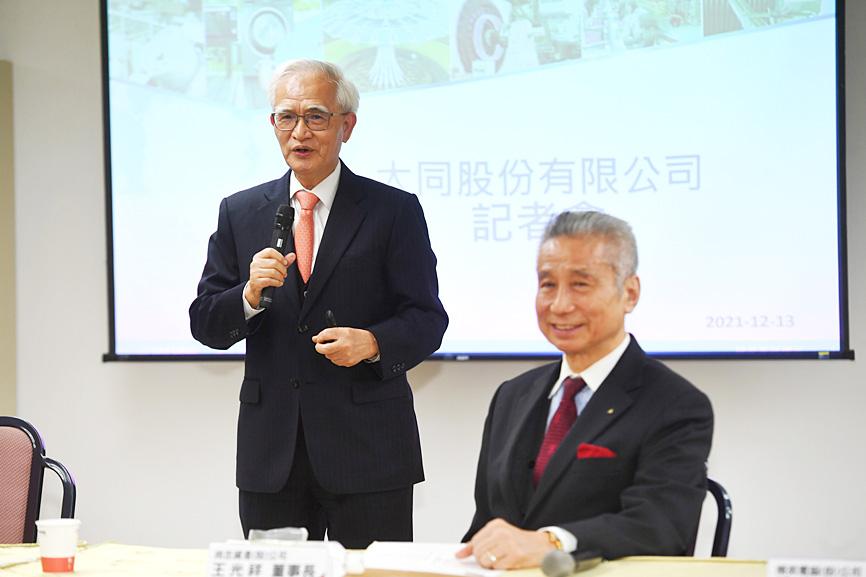Tatung Co (大同) chairman Lu Ming-kuang (盧明光) and president Chaney Ho (何春盛) yesterday announced their resignations, adding further uncertainty at the troubled conglomerate which has undergone several changes to its management team since last year.
When he took the job late last year, 72-year-old Lu had envisioned implementing a five-year plan to turn the company around before retiring again. Yesterday, he said he was proud of what he had achieved since returning to the company.
“I’ve not done wrong by the largest shareholder, the employees or the investors who came in because they believed in my management team,” Lu told a news conference in Taipei.

Photo: CNA
Lu came out of retirement to take over as chairman in December last year after his predecessor, Lin Wen-yuan (林文淵), stepped down from the position after 50 days in office amid a disagreement with major shareholder Shanyuan Group (三圓建設) chairman Wang Kuang-hsiang (王光祥).
Under Lu’s leadership, Tatung’s nine business units all returned to profitability, Ho said.
“We did our level best to save Tatung” said Ho, who joined the company in June. “We took a company that was going backward and turned it into a company that was making a slow forward motion.”
However, that was not enough for Wang, who yesterday thanked, praised and bowed to Lu and Ho, before escorting them out of the news conference.
It is time for Tatung to start paying a dividend again and develop its substantial real-estate assets, said Wang, who is a director of Tatung and also chairs the company’s real-estate subsidiary, Shan Chih Asset Development Co (尚志資產開發).
“Tatung shareholders are like paupers sitting in a house made of gold,” Wang said.
There are rumors that Wang is likely to take over as Tatung chairman when the company holds a board meeting on Tuesday next week.
“We will now comprehensively develop our real-estate portfolio, our renewable energy business and our electric bus,” Wang said. “Chairman Lu was hardworking and conscientious, but it’s been 20 years since Tatung paid a dividend, we will not let our investors wait another five.”
Chung Yi-wen (鍾依文), who made way for Ho in June, is expected to return as president.
“The fundamental principle of business is profitability,” Chung said.

South Korea’s equity benchmark yesterday crossed a new milestone just a month after surpassing the once-unthinkable 5,000 mark as surging global memory demand powers the country’s biggest chipmakers. The KOSPI advanced as much as 2.6 percent to a record 6,123, with Samsung Electronics Co and SK Hynix Inc each gaining more than 2 percent. With the benchmark now up 45 percent this year, South Korea’s stock market capitalization has also moved past France’s, following last month’s overtaking of Germany’s. Long overlooked by foreign funds, despite being undervalued, South Korean stocks have now emerged as clear winners in the global market. The so-called “artificial intelligence

‘SEISMIC SHIFT’: The researcher forecast there would be about 1.1 billion mobile shipments this year, down from 1.26 billion the prior year and erasing years of gains The global smartphone market is expected to contract 12.9 percent this year due to the unprecedented memorychip shortage, marking “a crisis like no other,” researcher International Data Corp (IDC) said. The new forecast, a dramatic revision down from earlier estimates, gives the latest accounting of the ongoing memory crunch that is affecting every corner of the electronics industry. The demand for advanced memory to power artificial intelligence (AI) tasks has drained global supply until well into next year and jeopardizes the business model of many smartphone makers. IDC forecast about 1.1 billion mobile shipments this year, down from 1.26 billion the prior

Chinese artificial intelligence (AI) start-up DeepSeek’s (深度求索) latest AI model, set to be released as soon as next week, was trained on Nvidia Corp’s most advanced AI chip, the Blackwell, a senior official of US President Donald Trump’s administration said on Monday, in what could represent a violation of US export controls. The US believes DeepSeek will remove the technical indicators that might reveal its use of American AI chips, the official said, adding that the Blackwells are likely clustered at its data center in Inner Mongolia, an autonomous region of China. The person declined to say how the US government received

People stand in a Pokemon store in Tokyo on Thursday. One of the world highest-grossing franchises is celebrated its 30th anniversary yesterday.